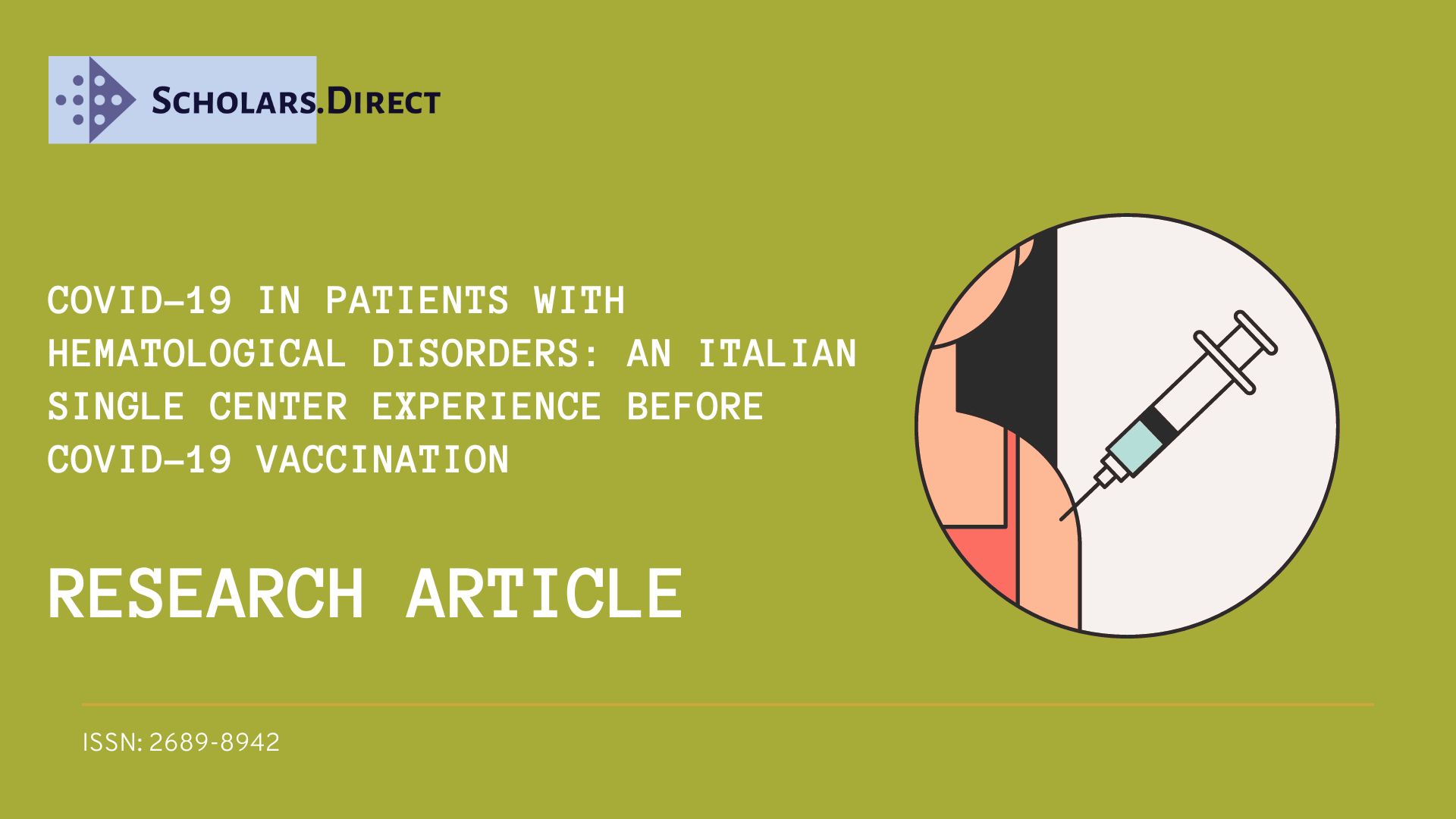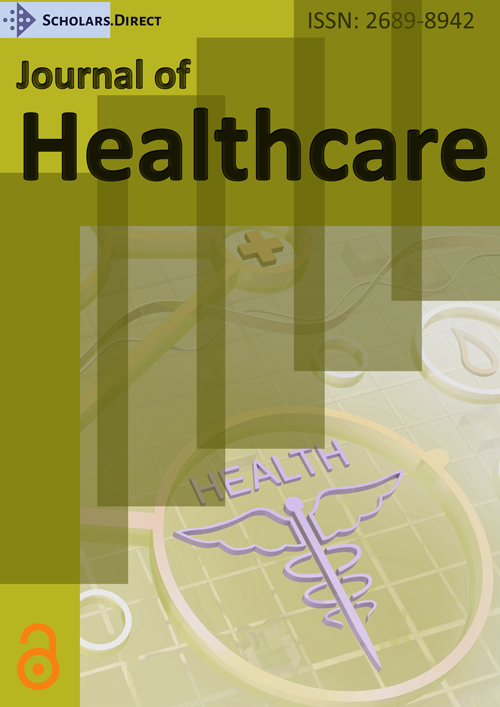Covid-19 in Patients with Hematological Disorders: An Italian Single Center Experience before Covid-19 Vaccination
Abstract
Background: A novel severe acute respiratory syndrome (SARS)-like coronavirus (SARS-CoV-2) has emerged as a human pathogen, causing global pandemic and resulting in over 400,000 deaths worldwide. In the literature, there are several reports in patients with cancer and COVID-19 infection. These studies demonstrated that patients with solid tumors had a higher risk of contracting SARS-CoV-2 infection, because of their systemic immunosuppressive state, caused by the malignancy and anticancer treatments, such as chemo therapy or surgery. On the contrary, very few data are available on COVID-19 outcomes in patients with hematologic diseases.
Methods: We report data on 5 patients with hematological disease referred to a single medical hematology unit of a general hospital from January and October, 2020. During 2020, no vaccines were available.
Results: Five patients were on active cancer therapy during the infection. Overall 5 patients developed pneumonia and all patients are alive.
Conclusion: In conclusion, our study, which describes a small local experience, show how patients suffering from hematological diseases can contract covid infection and that in times of pandemic, it is important to maintain social distancing and think about a reduction in hospital visits. In this out-patient setting, it is important to reduce hospital admission as it is a potential risk factors for SARS-CoV-2 infection.
Keywords
COVID-19, Pandemic, Hematological disease, Telemedicine
Introduction
A novel severe acute respiratory syndrome (SARS)-like coronavirus (SARS-CoV-2) has emerged as a human pathogen, causing global pandemic and resulting in over 400,000 deaths worldwide. The infection, that emerged in China at the end of 2019, named Coronavirus Disease 2019 (COVID-19), is now spreading worldwide. Mortality can be as high as 15% in elderly patients, and/or in patients with comorbidities [1]. On the basis of the current data, the time from exposure to symptom development is between 2 and 14 days [2]. At present, the important therapeutic arm is the available vaccine, in addition isolation of infected persons and social distancing are recommended by the WHO [3]. In the literature, there are several reports in patients with cancer and COVID-19 infection. These studies demonstrated that patients with solid tumor shade higher risk of contracting SARS-CoV-2 infection, because of their systemic immunosuppressive state, caused by the malignancy and anti cancer treatments, such as chemotherapy or surgery [4]. On the contrary, very few data are available on COVID-19 outcomes in patients with hematologic diseases.
Material and Methods
This is a retrospective monocentric observational study on patients with hematologic disease admitted to the Hematology Unit (out-patient admissions) of ASL Roma 1, Rome, Italy, All patients in our unit who were diagnosed with COVID-19 from January and October, 2020 were included in this study. All patients had a confirmed diagnosis of COVID-19 defined by a positive result on a real-time RT-PCR assay of a specimen collected on a nasopharyngeal swab. None of the patient have done vaccination, because at this time is not available.
Patient characteristics, treatments, and outcome data were collected retrospectively. The study was approved by the local ethical committee.
Results
Outlined below are the medical records, including demographic, clinical, and treatment data of 5 adult patients with COVID-19 infection.
The median age of infected patients was 62 (range, 54-77 years), two patients were older than 60-years and 2/5 were female. Among all the patients, 4/5 were already hospitalized at the time of symptoms, but none of them received mechanical ventilation. All the patients were treated at home with corticosteroids, antibiotic therapy and anticoagulant treatment. The most common symptoms at diagnosis were fever (n = 4) and cough (n = 3).
Four out of five patients were affected by Philadelphia Negative Disorders (MPN) and one patient had a Follicular Non Hodgkin Lymphoma (NHL).
The four patients affected by MPN were treated at the time of COVID-19 diagnosis, with hydroxyl urea (3/4) and ruxolitinib (1/4). The patient with NHL was in rituximab maintenance therapy. In all the patients, the origin of COVID-19 infection was unknown. In Table 1, are summarize the clinical characteristics of the five cases.
Discussion
Despite, being a small series of hematological patient with COVID-19 infection, this study highlights the following observations: Disease treatment and hematologic disease can have a prolonged immunosuppression that can increased susceptibility in SARS-CoV-2 infection. The small number of cases, does not allow an analysis of the impact of single treatment in the infection. In addition, we must emphasize that the median age of our patient were 62-years of age, and only two patients was over 70-years and had an additional comorbidity. In fact, one patient had 70-years with cardiac problem and 77-years-old patient had additional chronic medical conditions, such as diabetes and history of cardiac problem.
To date, there are few data on risk of developing COVID-19 in patients with hematological cancer. A cohort study conducted in two Chinese centers in Wuhan on 128 hospitalized hematological cancer subjects showed that 10% (13/128) of them developed COVID-19 infection [5]. In addition, the Chinese group of Hubei also reported the prevalence of COVID-19 infection (0.9%) in Philadelphia-positive chronic myeloid leukemia patients [6]. Malard, et al. described 25 consecutive patients with hematological disease admitted to Hematology Department in France [7].
Recently, Breccia, et al. have reported a GIMEMA survey in patient with negative myeloproliferative disorders (MPN) that showed the incidence of COVID-19 infection has proven low in Ph-MPN patients and demonstrated a mortality rate that seems higher if compared to negative patients who developed non-COVID related pneumonia [8]. In addition, during the pandemic period, in Italy, regional directives recommended the activation of telemedicine (telephone- or video-conferencing) services in a specialist field, such as in hematology [9], to reduce the inflow of patients and risk of contagion.
In this setting, recently, Palandri, et al. described a telemedicine project that was activated in hematologic center in Italy to reduce face-to-face visits and covid infection [10].
In conclusion, our study, which describes a small local experience before the available vaccine, show how patients suffering from hematological diseases can contract covid infection and that in times of pandemic, it is important to maintain social distancing and think about a reduction in hospital visits. In this out-patient setting, it is important to reduce hospital admission as it is a potential risk factors for SARS-CoV-2 infection. Moreover, further studies are needed to improve the knowledge about the impact on daily management in hematological patients during pandemic emergency.
Acknowledgements
A.R. wrote the manuscript; T.C.T. wrote and revised the manuscript.
Funding
No funding has been provided for the study.
Conflict of Interest
Not applicable.
Author Contributions
A.R. and T.C.D.T write the manuscript.
References
- Chan WJ, Ni ZY, Hu Y, et al. (2020) Clinical characteristics of coronavirus disease 2019 in China. N Engl J Med 382: 1708-1720.
- Lauer SA, Grantz KH, Bi Q, et al. (2020) The incubation period of coronavirus disease 2019 (COVID-19) from publicly reported confirmed cases: Estimation and application. Ann Intern Med 172: 577-582.
- Koo JR, Cook AR, Park M, et al. (2020) Interventions to mitigate early spread of SARS-CoV-2 in Singapore: A modeling study. Lancet Infect Dis 20: 678-688.
- Liang W, Guan W, Chen R, et al. (2020) Cancer patients in SARS-CoV-2 infection: A nationwide analysis in China. Lancet Oncol 21: 335-337.
- He W, Chen L, Chen L, et al. (2020) COVID19 in persons with hematological cancers. Leukemia 24: 1-9.
- Li W, Wang D, Guo J, et al. (2020) COVID19 in persons with chronic myeloid leukaemia. Leukemia 34: 1799-1804.
- Malard F, Genthon A, Brissot E, et al. (2020) COVID-19 outcomes in patients with hematologic disease. Bone Marrow Transplant 55: 2180-2184.
- Breccia M, Abruzzese E, Bocchia M, et al. (2020) Chronic myeloid leukemia management at the time of the Covid-19 pandemic in Italy. A campus CML survey. Leukemia 34: 2260-2261.
- (2020) Attivazione servizi di telemedicina in ambito specialistico e territoriale. Aggiornamento del Catalogo Unico Regionale (CUR). Decreto del Commissario ad Acta 22 luglio 2020, n. U00103.
- Palandri F, Bartoletti D, Giaquinta S, et al. (2020) Telemedicine in patients with hematological diseases during the coronavirus disease 2019 (COVID-19) pandemic: Selection criteria and patients' satisfaction. Br J Haematol 192: e48-e51.
Corresponding Author
Angela Rago, MD, PHD, Hematology Unit, ASL ROMA 1, Santo Spirito Hospital of Rome, Lungotevere in Sassia 1, 00198 Rome, Italy, Tel: +39-0668352071, Fax: +39-0668352045.
Copyright
© 2022 Angela R. et al. This is an open-access article distributed under the terms of the Creative Commons Attribution License, which permits unrestricted use, distribution, and reproduction in any medium, provided the original author and source are credited.





